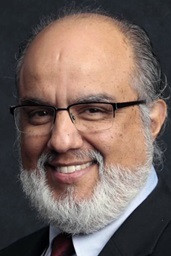
Photo courtesy of the author.
Commentaries
If we have learned one thing during the COVID-19 pandemic, it is that online communion should not be here to stay.
I know what you’re thinking. “What is he talking about?!? COVID has proven that we NEED online communion.”
Before I lose you, let me say that COVID has humbled me and my theology around the sacrament of Holy Communion. If you had asked me one year ago whether or not I thought online communion was ever appropriate, I would have given a simple binary answer of “no.”
However, I would have never anticipated the gravity of the situation we would be in one year later. Over half a million Americans alone have lost their lives to a virus none of us understood at the beginning of March 2020. With congregations unable to congregate physically in their sanctuaries — with the exception of the now regular parking lot worship service — online communion has become a necessity.
In this time of physical distance, online communion has provided for our communities the closest thing to the physical Body of Christ that they can get while huddled in their homes. This pandemic has made us question what it means to be an incarnational body. If we questioned before whether the incarnational nature of our sacraments could be fulfilled by digital mediums, our questions have been resoundingly answered.
That said, the future of online communion should still be in question, lest we slip back into a binary and make the generalized assumption that just because online communion is positive during a global pandemic, it always will be.
All of us, regardless of age, race, gender, sexuality or ethnicity, are going to be different people on the other side of this crisis. We now long for the days of large social gatherings and churches packed to the brims with people. We long to see those we love who have been distanced from us for over a year now. The reality we once took for granted is a thing of the past. If anything, this pandemic has likely made our longing for the real presence of the Body of Christ in the community of believers gathered together that much stronger, and rightfully so.
So let me get down to brass tacks. Holy Communion, when normality returns and we can gather safely again, should only be mediated in the physical presence of our church communities. It should not be provided online.
Anticipating criticism, let me say I am aware that through the power of the God-given gift of the internet we have been able to reach people through Holy Communion who normally cannot participate: shut-ins, families in other states, members who have moved away and, of course, those who have been isolated by the pandemic. I am certainly not arguing that church services should not continue to be online to reach those communities, because they should.
However, Holy Communion shouldn’t be. Let’s focus particularly on the community that will continue to be unable to attend our services once the pandemic is over: shut-ins. How sad is it as a church that we flaunt the power of the internet to provide shut-ins participation in communion – an experience they normally would not have? What does that say about our church?
It says that many of our communities – not all, but many – weren’t doing their part in reaching out to shut-ins with Holy Communion prior to the outbreak. It says that the pastor is likely bearing too much of the burden of pastoral care and is spread too thin to provide care to those unable to attend. It says, fundamentally, that COVID-19 has revealed for us a shortcoming in our ability to live into the sacramental demand that we be “for the world the Body of Christ redeemed by his blood,” in the words of our United Methodist liturgy.
Communion is not a stagnant practice. Our sacraments make demands on our lives, and Holy Communion demands we participate in the lives of our fellow Christians, even if they are unable to leave their homes.
Normalizing the practice of online Holy Communion post-COVID means no longer taking the elements to shut-ins in their homes. It means making the incarnational nature of the sacraments a distant reality for those in our communities already disenfranchised by their physical or mental health. It shrinks the already dramatically shrinking community of our most isolated members of the Body of Christ.
Practicing online communion in a post-COVID world is not so much an act of justice for those socially isolated as it is a convenience for the able-bodied members of our church — and for pastors who will no longer have to visit with people who already live on the outskirts of most of our consideration and the incarnational ministry of the church.
Ending the practice of online communion once the pandemic is over forces us, laity and clergy alike, to participate in the lives of our members permanently isolated by conditions beyond their control. That is the simple work of the local church we so often forget in our modern obsession with issues of justice.
Certainly, that obsession is one heavily influenced, rightly, by Scripture. However, we must not forget the little acts of divine justice we can do every day. Like providing for the shut-in community the physical presence of the Body of Christ, which is something that cannot be fully mediated through the internet. The internet decenters the communal nature of Holy Communion and refocuses our lens on an individualism that only further isolates those in need.
Fundamentally, if those who were unable physically to attend church needed our physical presence in their lives before COVID and the age of online communion, they’re going to need it that much more after a full year of isolation and despair.
Continuing the practice of online communion in the name of inclusion and justice for the differently abled who are shut-in due to their condition is a farce. We are not including them, nor are we doing justice for them. We are taking our responsibility for their spiritual fulfillment and relegating it to a medium we all agree, after the pain of this year of isolation and unbelievable loss, is not adequate to meet our needs for physical and incarnational community.
Online communion is just one more excuse for us to not give our differently abled brothers and sisters in Christ the love, community and grace of God they so deserve.
Crickenberger is a third-year seminary student at the Candler School of Theology pursuing ordained ministry as an elder in the Holston Conference of The United Methodist Church. Previously, he served two churches in the North Georgia Conference as a student pastor.
News contact: Tim Tanton or Joey Butler at (615) 742-5470 or [email protected]. To read more United Methodist news, subscribe to the free Daily or Weekly Digests.
Like what you're reading? Support the ministry of UM News! Your support ensures the latest denominational news, dynamic stories and informative articles will continue to connect our global community. Make a tax-deductible donation at ResourceUMC.org/GiveUMCom.



